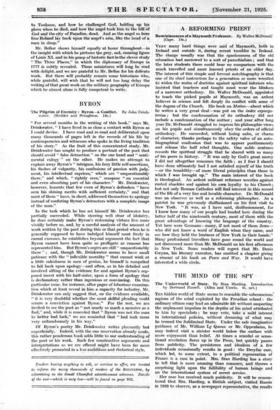BYRON
The Pilgrim of Eternity : Byron—a Conflict. By John Drink- water. (Hodder and Stoughton. 18s.)
" For several months in the writing of this book," says Mr. Drinkwater, " I have lived in as close a contact with Byron as I could devise. I have read and re-read and deliberated upon many thousands of pages left in the records of his life by contemporaries and witnesses who spoke in the living tradition of his story." As the fruit of this concentrated study, Mr. Drinkwater has sought to produce a portrait of the poet that should avoid " false detraction " on the one hand and " senti- mental eulogy " on the other. He makes no attempt to explain away Byron's " intrigues, his fiery little self-assertions, his flashes of vulgarity, his confusions of passion with judg- ment, his intellectual caprices," which are " unquestionably there," and which, " rightly seen," compose " an essential and even absorbing part of his character." Mr. Drinkwater, however, laments that few even of Byron's defenders " have seen his shining merits with sufficient certainty," and that most of them " have, in short, addressed themselves to apology
instead of confuting By roe's detractors with a complete image of the man."
In the task which he has set himself Mr. Drinkwater has partially succeeded. While steering well clear of idolatry, he does certainly make Byron's redeeming virtues live more vividly before us, and, by a careful analysis of the amount of work written by the .poet during this or that period when he is generally supposed to have indulged himself most freely in carnal excesses, he establishes beyond argument the fact that Byron cannot have been quite so profligate as rumour has represented him. But Byron's orgies are still unquestionably there " ; and, though Mr. Drink-water seems to have small patience with the " inflexible morality " that cannot wink at a little rakishness in men of genius, he himself is compelled to fall back upon apology—and often, as in his detailed and involved sifting of the evidence for and against Byron's sup- posed incest with his half-sister, upon a form of apology that is declamatory rather than ingenious or convincing. On this particular issue, for instance, after pages of laborious examina- tion which at least reveal in him a capacity for industry, Mr, Drinkwater can only suggest that, on the evidence available, " it is very doubtful whether the most skilful pleading could secure a conviction against Byron." For the rest, we are invited to see the poet as " not nearly so much a monster as a fool," and, while it is conceded that " Byron was not the man to better bad luck," we are reminded that " bad luck came very unhandsomely in his way."
Of Byron's poetry Mr. Drinkwater writes pleasantly but superficially. Indeed, with the one reservation already made, this rather ponderous book adds little to our understanding of the poet or his work. Such few constructive arguments and interpretations as we are offered might have been far more effectively presented in a less ambitious and rhetorical style.














































 Previous page
Previous page